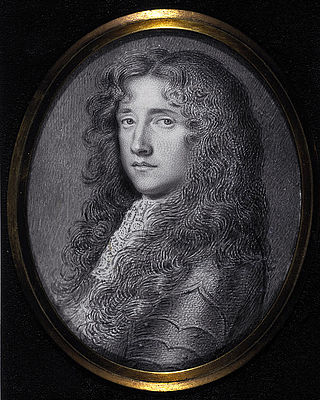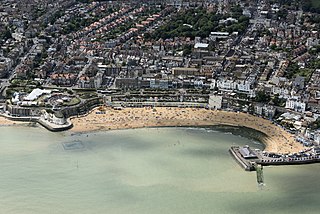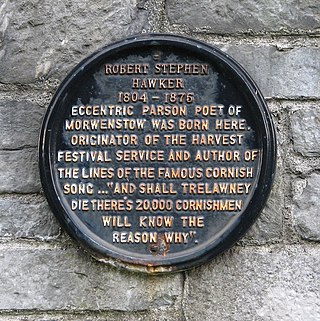
Bonnie Dundee is the title of a poem and a song written by Walter Scott in 1825 in honour of John Graham, 7th Laird of Claverhouse, who was created 1st Viscount Dundee in November 1688, then in 1689 led a Jacobite rising in which he died, becoming a Jacobite hero.

Broadstairs is a coastal town on the Isle of Thanet in the Thanet district of east Kent, England, about 80 miles (130 km) east of London. It is part of the civil parish of Broadstairs and St Peter's, which includes St Peter's, and had a population in 2011 of about 25,000. Situated between Margate and Ramsgate, Broadstairs is one of Thanet's seaside resorts, known as the "jewel in Thanet's crown". The town's coat of arms' Latin motto is Stella Maris. The name derives from a former flight of steps in the chalk cliff, which led from the sands up to the 11th-century shrine of St Mary on the cliff's summit.
"Tom o' Bedlam" is the title of an anonymous poem in the "mad song" genre, written in the voice of a homeless "Bedlamite". The poem was probably composed at the beginning of the 17th century. In How to Read and Why Harold Bloom called it "the greatest anonymous lyric in the [English] language."

The Mary White was a lifeboat based in Broadstairs, Kent, England, named in 1851 after the completion of an heroic rescue of a brig, the Mary White.

The Ramsgate tugs were a series of tugboats used at Ramsgate harbour since the 19th century. The harbour's development coincided with the growing use of the steam tugs that were then being built for the shipping industry.

"The Song of the Western Men", also known as "Trelawny", is a Cornish patriotic song, composed by Louisa T. Clare for lyrics by Robert Stephen Hawker. The poem was first published anonymously in The Royal Devonport Telegraph and Plymouth Chronicle in September 1826, over 100 years after the events.
"Streets of Laredo", also known as "The Dying Cowboy", is a famous American cowboy ballad in which a dying ranger tells his story to another cowboy. Members of the Western Writers of America chose it as one of the Top 100 Western songs of all time.
"Brisbane Ladies" is an Australian folksong and is one of many adaptations of the traditional British naval song "Spanish Ladies". The version given below is the most commonly sung, but the original mentions Nanango favorably as "that jolly old township". The song is also known as "Augathella Station".
Captain Ward and the Rainbow, or Ward the Pirate, is Child ballad 287. It recounts a tale of the pirate Captain Ward, likely Jack Ward.

Walmer Lifeboat Station was established in 1830. Over two thousand ships are believed to have been wrecked on the Goodwin Sands, and the masts of several wrecks are visible from the shore at low tide. Hence there have always been two lifeboats located at the joined towns of Deal and Walmer along the coast opposite the sands.
"Barnacle Bill the Sailor" is an American drinking song adapted from "Bollocky Bill the Sailor", a traditional folk song originally titled "Abraham Brown".
The lyrics to the song "Slattery's Mounted Foot" were written in 1889 by the 19th century Irish musician Percy French. The song is representative of French's comic works. The tune of the chorus differs from that of the main lyrics.

Rosemary Lane"is an English folksong: a ballad that tells a story about the seduction of a domestic servant by a sailor. According to Roud and Bishop
"An extremely widespread song, in Britain and America. Its potential for bawdry means that it was popular in male-centred contexts such as rugby clubs, army barracks and particularly in the navy, where it can still be heard, but traditional versions were often collected from women as well as men."
Jolly Roving Tar is a traditional Newfoundland folk song. In its 19th-century version, the song relates the story of Susan, lamenting the wanderings of her beloved "tar", or sailor, William, who is at sea, and deciding to follow him in her father's boat. The title is also applied to the folk song* "Get up, Jack! John, sit down!", a reel of unknown provenance in which some, but not all, versions includes the line, "Come along, come along, my jolly brave tars, there's lots of grog in the jars."
"Fight For Santa Clara" is the fight song of the Santa Clara University. It was composed by Winnie Cutter, a graduate of the class of 1905. in 1898 following the last-minute football victory over the University of Chicago that clinched a league championship.

Jackets Green is an Irish ballad by Michael Scanlan (1833–1917) concerning an Irish woman and her beloved, an Irish soldier fighting in the Jacobite army of Patrick Sarsfield during the Williamite War of the late 17th century. Like some other "patriotic" Irish ballads, it includes romantic rather than historically accurate descriptions. This includes, at its core, the assertion that Sarsfield's men wore green uniforms, when the Irish Brigade, initiated by the Jacobite soldiers under Sarsfield's command, actually wore red uniforms.
Van Diemen's Land or Henry the Poacher, Young Henry's Downfall, Beware Young Men. is an English transportation ballad. It was widely published in broadsides during the 19th century, and was collected from traditional singers in England during the twentieth century. It has been recorded by many singers influenced by the British folk revival.
"When Jones' Ale Was New" is an English folk song about men of various trades drinking at an ale-house or tavern. Other titles include "Joan's Ale is New" and "When Johnson's Ale Was New". Originating in the 16th century CE it has been collected frequently from traditional singers in England, and has been found occasionally in Scotland and the USA. It has evolved over the years, and is popular as a chorus song in folk clubs in England.








